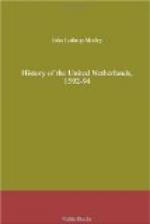With the chief personage he had to deal with he professed himself, at first, well satisfied. “The Duke of Mayenne,” said he to Philip, “persists in desiring your Majesty only as King of France, and will hear of no other candidate, which gives me satisfaction such as can’t be exaggerated.” Although there were difficulties in the way, Farnese thought that the two together with God’s help might conquer them. “Certainly it is not impossible that your Majesty may succeed,” he said, “although very problematical; and in case your Majesty does succeed in that which we all desire and are struggling for, Mayenne not only demands the second place in the kingdom for himself, but the fief of some great province for his family.”
Should it not be possible for Philip to obtain the crown, Farnese was, on the whole, of opinion that Mayenne had better be elected. In that event he would make over Brittany and Burgundy to Philip, together with the cities opposite the English coast. If they were obliged to make the duke king, as was to be feared, they should at any rate exclude the Prince of Bearne, and secure, what was the chief point, the Catholic religion. “This,” said Alexander, “is about what I can gather of Mayenne’s views, and perhaps he will put them down in a despatch to your Majesty.”
After all, the duke was explicit enough. He was for taking all he could get—the whole kingdom if possible—but if foiled, then as large a slice of it as Philip would give him as the price of his services. And Philip’s ideas were not materially different from those of the other conspirator.
Both were agreed on one thing. The true heir must be kept out of his rights, and the Catholic religion be maintained in its purity. As to the inclination of the majority of the inhabitants, they could hardly be in the dark. They knew that the Bearnese was instinctively demanded by the nation; for his accession to the throne would furnish the only possible solution to the entanglements which had so long existed.
As to the true sentiments of the other politicians and soldiers of the League with whom Bearnese came in contact in France, he did not disguise from his master that they were anything but favourable.
“That you may know, the, humour of this kingdom,” said he, “and the difficulties in which I am placed, I must tell you that I am by large experience much confirmed in that which I have always suspected. Men don’t love nor esteem the royal name of your Majesty, and whatever the benefits and assistance they get from you they have no idea of anything redounding to your benefit and royal service, except so far as implied in maintaining the Catholic religion and keeping out the Bearne. These two things, however, they hold to be so entirely to your Majesty’s profit, that all you are doing appears the fulfilment of a simple obligation. They are filled with fear, jealousy, and suspicion of your Majesty. They




